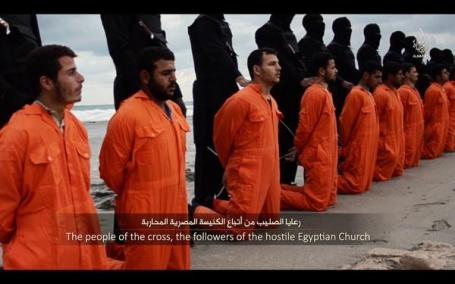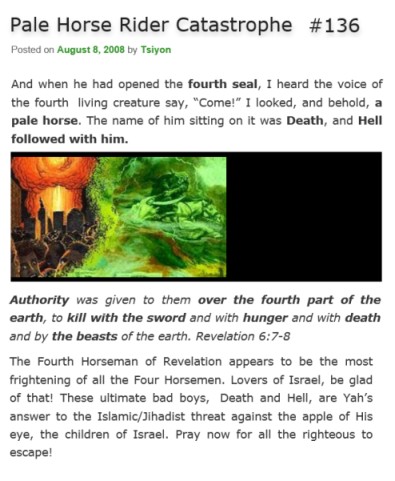 The mass murder, which provoked a volley of Egyptian air strikes on the group’s Libyan stronghold of Derna, realised long-held fears of militants reaching the Mediterranean coast.
The mass murder, which provoked a volley of Egyptian air strikes on the group’s Libyan stronghold of Derna, realised long-held fears of militants reaching the Mediterranean coast.
Isis started in Iraq and now controls swathes of adjoining Syria, including along the Turkish border, as part of its so-called Islamic State.
Its ideology has spread much further, with pledges of allegiance from terrorist groups in Egypt, Gaza, Jordan, Lebanon, Saudi Arabia, Tunisia, Yemen and now Libya.
Days before Isis released its gory video depicting the Egyptians’ beheadings, Libya’s former Prime Minister warned that the group would soon reach the Mediterranean and even Europe if order was not restored in the country.
Ali Zeidan said Libya’s fractured government and easy access to weapons seized during the fall of Colonel Gaddafi made it more susceptible to the activities of jihadists, according to The Times.
“(Isis) are growing. They are everywhere,” he added.
“In Libya, the situation is still under control. If we leave it one month or two months more I don’t think you can control it.
“It will be a big war in the country and it will be here in Europe as well.”
Libya has seen fierce fighting between rival militias since Gaddafi was overthrown during the 2011 Arab Spring.
Mr Zeidan, who fled to Europe after losing a parliamentary vote of confidence, reported that Isis had a growing presence in some of the bigger cities and was trying to recruit fighters from rival Islamist groups.
 Aref Ali Nayed, Libya’s ambassador to the United Arab Emirates, also said Isis’s presence in Libya was increasing “exponentially”.
Aref Ali Nayed, Libya’s ambassador to the United Arab Emirates, also said Isis’s presence in Libya was increasing “exponentially”.
Its military gains last summer sparked a rush by other Islamist groups in the Middle East and North Africa to ally themselves with the group by pledging allegiance and changing their names.
The jihadists behind the beheadings in Libya call themselves the Tripoli Province of the Islamic State.
 As the turmoil in Libya continued last year, they gained control of the port city of Derna and nearby Sirte, where Isis seized the murdered Coptic hostages in December and January.
As the turmoil in Libya continued last year, they gained control of the port city of Derna and nearby Sirte, where Isis seized the murdered Coptic hostages in December and January.
The location of their murders could not be confirmed but footage showed them dressed in orange jumpsuits kneeling on a beach. Behind each of them were masked militants who wielded their knives to kill the bound hostages simultaneously.
Isis affiliates have also claimed responsibility for attacks on the Egyptian military and police in the Sinai Peninsula, further along the Mediterranean coast between Egypt and Gaza.
***
The
Islamic War on Christianity
Reprint from: The Independent,
17 February, 2015

ISIS leads 21 Coptic Christians to their
beheadings on a beach in Libya
Almost fifteen hundred years ago, a wandering monk called John Moschos described the Eastern Mediterranean as a "flowering meadow" of Christianity. The religion had been born here nearly 600 years before but while, in the early years, it had been a persecuted, militant cult, under the patronage of the Byzantine emperors it had matured and mellowed. "The meadows in spring present a particularly delightful prospect," Moschos wrote in his book The Spiritual Meadow, which became a 7th-century best-seller. "One part of this meadow blushes with roses; in other places lilies predominate; in another violets blaze out…"
Christianity, in other words, was now flourishing right across
the region. No intolerant tyranny menaced it, no other religion
contested its right to grow and prosper and develop in different
ways. "The Eastern Mediterranean world was almost entirely
Christian" in Moschos's day, William Dalrymple wrote in his 1997
book From the Holy Mountain. "At a time when Christianity had
barely taken root in Britain… the Levant was the heartland of
Christianity and the centre of Christian civilisation… The
monasteries of Byzantium were fortresses whose libraries and
scriptoria preserved classical learning, philosophy and medicine
against the encroaching hordes of raiders and nomads [and] the
Levant was still the richest, most populous and highly educated
part of the Mediterranean world."
Today, the picture is dramatically different. Every corner of
the Middle East is locked in more or less violent struggle, but
whatever course the future takes, it is safe to predict that
Christians will play only a marginal part in it – if they survive
at all. Already, as the Prince of Wales recently pointed out, there
is a smaller proportion of Christians in the region than in any
other part of the world: just 4 per cent, and falling fast. Sunni
Muslim extremists see them not as "people of the Book" – members,
like Muslims, of one of the three great Abrahamic religions – but
as infidels, bracketed as the odious Other alongside Shias,
apostates, atheists, Baha'is.
For Muslim extremists, the Christian minority has become a
favoured target because they belong to the "wrong" religion; are
numerically few, weak and vulnerable; and are identified with the
oppressive policies of the Christian United States and Europe.
As Dr Khataza Gondwe, of Christian Solidarity Worldwide, told
me: "In Egypt and elsewhere, extreme Islamism portrays Christians
as a non-legitimate or foreign community that has no right to be
there – as a special interest group of the West. In Iraq, the
debate surrounding the invasion and war has distorted the issue
and, meanwhile, the Islamist extremists there have decimated one of
the oldest Christian populations in the world."
 Battlefields of belief: Egyptian Coptic Christians visiting a church (Getty Images)
Battlefields of belief: Egyptian Coptic Christians visiting a church (Getty Images)
Some of the most shocking cases of religious persecution in
recent years have involved Muslims. Twelve years ago, in the Indian
state of Gujarat, nearly 800 Muslims died in riots orchestrated by
Hindu nationalist militants. In Burma, violence against Muslims
committed by Buddhists, including Buddhist monks, has erupted
repeatedly since the killing of a Buddhist girl in Arakan state in
June 2012, despite condemnation by the outside world.
But those ugly events are peculiar to the countries in which
they occurred. The attacks on Christians, by contrast, follow a
clear pattern from country to country. From Nigeria and Somalia via
Egypt, Syria and Iraq to Pakistan, Christians are being targeted
ever more frequently by Islamist extremists. A sample of atrocities
across these countries gives an idea of the rising tide of terror
from which Christians are suffering:
In Egypt, many supporters of deposed President Morsi
irrationally blamed Coptic Christians for his downfall, and took
revenge on them. They seized control of the remote town of Delga,
burning down three of the five churches there, and forced thousands
of Christians to flee. They looted the 1,600-year-old monastery of
the Virgin Mary and St Abraam and set fire to it. "They [the Copts]
alone were set up as scapegoats and erroneously blamed for
instigating the violent dispersal of pro-Morsi demonstrators,"
Bishop Angaelos, of the Coptic Orthodox Church in the UK, told a US
Congressional hearing.
In Syria, as jihadists gained the upper hand over more
moderate rebels, the village of Maaloula, where many still speak
ancient Aramaic, the language of the Bible, was invaded by rebels
who attacked churches, forcing many among the 3,000-strong
population to flee. Elsewhere in the country, two archbishops were
abducted by gunmen in April last year and have yet to reappear.
In Iraq on Christmas Day, 24 people were killed when a bomb
exploded outside a church in Doura, southern Baghdad, as
worshippers were leaving at the end of a service. Dozens more
Christians were killed elsewhere in the country during the
Christmas period. Prior to the Iraq war, there were 1.4 million
Christians in the country, around 3 per cent of the population.
Since then, the number has fallen to about 300,000. Raphael I Sako,
the Chaldean Patriarch of Baghdad, said: "If emigration continues,
God forbid, there will be no more Christians in the Middle East.
[The Church] will be no more than a distant memory."
In Pakistan, 85 Christians were killed when two suicide
bombers blew themselves up outside a historic church in the
frontier city of Peshawar in September 2013. Standing in the
church's courtyard and comforting the wounded, the Bishop Emeritus
of Peshawar, Mano Rumalshah, commented afterwards: "It's not safe
for Christians in this country. Everyone is ignoring the danger to
Christians in Muslim-majority countries. The European countries
don't give a damn about us."
Christian campaigners have long lamented the reluctance of
politicians or media in the West, and Europe in particular, to take
a stand against the growing wave of violence. Dr Gondwe remarks
that "sectarian attacks on Egyptian Copts have been occurring for
decades, but many people in the West have appeared reluctant to
speak out. For a time, it seemed as if journalists and human rights
organisations were anxious not to be seen as displaying a bias
towards Christianity."
But now, says Dr Gondwe, there has been "a complete turnaround.
In Nigeria, the brutality of the Islamist militia Boko Haram has
meant that people could not ignore the events on the ground. In
Egypt, Copts and young Muslims participated alongside each other in
the Tahrir Square protests, and members of the Muslim community
speak out strongly against sectarian violence. There are voices in
the Muslim community saying: 'We are Egyptians first'."
 The aftermath of a suicide bomb attack on a Catholic church in Nigeria (Getty Images)
The aftermath of a suicide bomb attack on a Catholic church in Nigeria (Getty Images)
Meanwhile, the recent changes at the top of the Catholic and
Anglican churches have also made a difference, with Pope Francis
and Archbishop Welby focusing attention on persecuted Christians.
But it was Prince Charles who said the previously unsayable in a
blunt speech to religious leaders at Clarence House at Christmas.
"We cannot ignore the fact," he told them, that [Christian
communities in the Middle East] are increasingly being targeted by
fundamentalist Islamist militants." He went on to except Jordan
from the charge – "Jordan has set a wonderful example… [it] is a
most heartening and courageous witness to the fruitful tolerance
and respect between faith communities."
Yet the latest research – from Open Doors, a US organisation
that publishes annual figures for Christian persecution – shows
that jihadi violence is increasingly spilling over into Jordan from
the Syrian civil war, causing Jordan to jump up eight places in the
list of countries where Christians are most at risk of
persecution.
..Christians are being
deliberately killed in large numbers on account of their faith in
the region where it first flourished. When John Moschos was
gathering his "flowers" from the unmown meadow of Christianity in
the late 6th century, the Byzantine Empire was already in steep
decline, and it was not long before the followers of the Prophet
Mohammed finished it off. Yet, despite the loss of its imperial
protector, Christianity in the region has survived more than a
millennium of Muslim domination. Its congregations may have shrunk
and its culture stagnated, but it was permitted a place and a role
of its own both in the Ottoman Empire and in the nation states that
succeeded it.
The idea that Christians – those fellow People of the Book –
should be bombed and slaughtered and terrified into flight, their
churches and monasteries burned down and their history expunged:
these evil developments are quite new. The Nazis did their best to
wipe out all trace of Judaism in Europe. A similar effort – less
systematic and scientific, certainly – now menaces the survival of
Christianity where it was born. We are beginning to see this
disaster for what it is. But it may be too late to reverse it.
 This
may surprise some readers, but I see this mass exodus of Christians and Jews
(including converted Muslims) from Muslim lands to be an answer to prayer, which
was called for in program #136 posted on our
Tsiyon.org website back in 2008 (See left). In that
program it was revealed that the pale horse rider of Revelation had been
released, and was already moving the Middle East Islamic countries toward a
catastrophic war in which untold numbers will be killed. Since then, events in
the Middle East have been tracking, as if by an unseen script, toward exactly
that fate. As we consider the multiple heinous crimes that radical Islam is
heaping up before YHWH, who can deny that such a punishment is not just? That
is, except for the righteous who live there. That's why, with that program, I
asked all listeners to begin praying for the righteous in the Islamic world to
escape, before the judgment falls. Today, in this newsletter, I feel the need to
renew that call. Friends, please, pray with me for all of the righteous now
dwelling in Islamic countries, that YHWH might quickly move them out of those
places, into places of safety for them, before catastrophic judgment falls upon
the jihadist enemies of YHWH. Make no mistake, this Islam-shattering war is
coming, and it will change everything, everywhere.
This
may surprise some readers, but I see this mass exodus of Christians and Jews
(including converted Muslims) from Muslim lands to be an answer to prayer, which
was called for in program #136 posted on our
Tsiyon.org website back in 2008 (See left). In that
program it was revealed that the pale horse rider of Revelation had been
released, and was already moving the Middle East Islamic countries toward a
catastrophic war in which untold numbers will be killed. Since then, events in
the Middle East have been tracking, as if by an unseen script, toward exactly
that fate. As we consider the multiple heinous crimes that radical Islam is
heaping up before YHWH, who can deny that such a punishment is not just? That
is, except for the righteous who live there. That's why, with that program, I
asked all listeners to begin praying for the righteous in the Islamic world to
escape, before the judgment falls. Today, in this newsletter, I feel the need to
renew that call. Friends, please, pray with me for all of the righteous now
dwelling in Islamic countries, that YHWH might quickly move them out of those
places, into places of safety for them, before catastrophic judgment falls upon
the jihadist enemies of YHWH. Make no mistake, this Islam-shattering war is
coming, and it will change everything, everywhere.




 The mass murder, which provoked a volley of Egyptian air strikes on the group’s Libyan stronghold of Derna, realised long-held fears of militants reaching the Mediterranean coast.
The mass murder, which provoked a volley of Egyptian air strikes on the group’s Libyan stronghold of Derna, realised long-held fears of militants reaching the Mediterranean coast. Aref Ali Nayed, Libya’s ambassador to the United Arab Emirates, also said Isis’s presence in Libya was increasing “exponentially”.
Aref Ali Nayed, Libya’s ambassador to the United Arab Emirates, also said Isis’s presence in Libya was increasing “exponentially”. As the turmoil in Libya continued last year, they gained control of the port city of Derna and nearby Sirte, where Isis seized the murdered Coptic hostages in December and January.
As the turmoil in Libya continued last year, they gained control of the port city of Derna and nearby Sirte, where Isis seized the murdered Coptic hostages in December and January.




